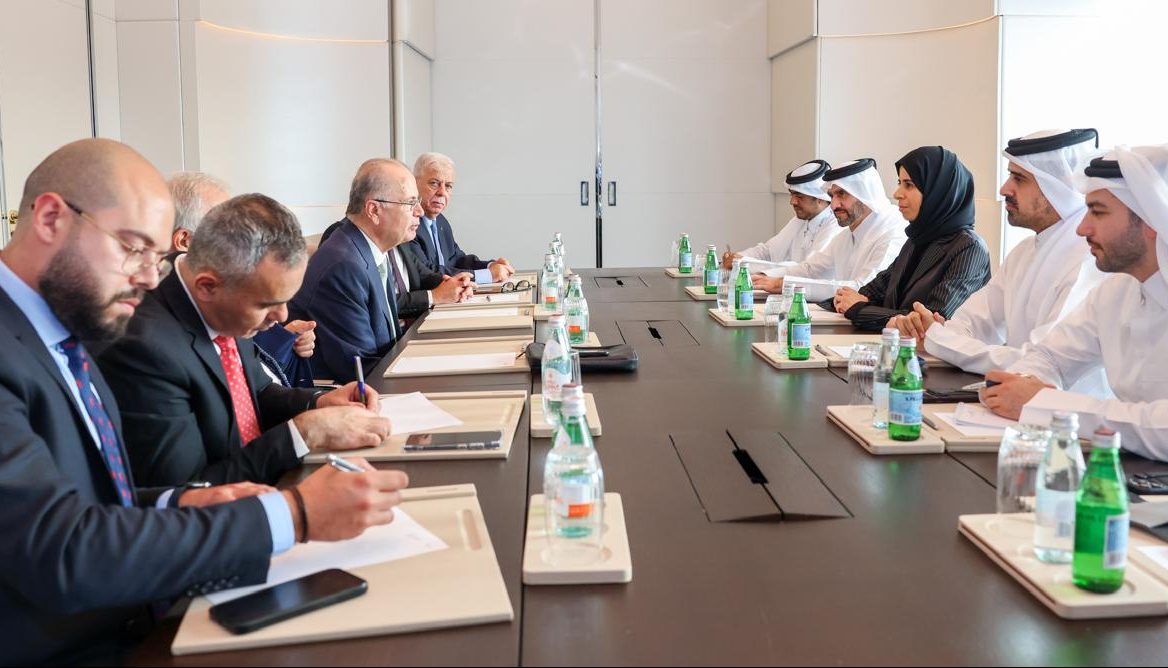The head of Hamas’s political bureau in Lebanon, Osama Hamdan, said the truce talks would stop if Israel invades Rafah.
Qatar’s Minister of State for International Cooperation Lolwah Al-Khater and Palestine’s Prime Minister Mohammed Mustafa discussed the latest developments in Gaza on Wednesday as the war nears its seven-month mark.
The discussions took place in Doha on the sidelines of the third Arab Economic and Cooperation Forum with countries of Central Asia and Azerbaijan.
“The meeting dealt with discussing bilateral cooperation and the latest developments in the Gaza Strip and the occupied Palestinian territories, particularly the regional and international efforts to reach a ceasefire and facilitate the unimpeded entry of humanitarian aid to all parts of the strip,” Qatar’s foreign ministry said in a statement.
The meeting came as Qatar continues to play a key mediating role in hopes of reaching a ceasefire in Gaza and a captives release deal.
Qatar and Egypt mediated a truce last year that lasted between November 24 and December 1 and led to the release of at least 109 captives from Hamas in Gaza. Israel also released 242 Palestinian prisoners, including women and minors, under the same deal.
Talks stalled since the truce expired, with Israel carrying out more massacres in Gaza while threatening to invade the densely-populated city of Rafah.
Nearly seven months on, Israel killed more than 34,500 people in the Strip and displaced at least 1.7 million people.
This week saw what appeared to be a fresh push by the mediators, including the United States, to reach a deal in Gaza.
This was seen with the visit of Hamas’s delegation to Cairo on Monday and the U.S. Secretary of State Antony Blinken’s regional tour this week.
Blinken’s tour, his seventh since the beginning of the war, included Saudi Arabia, Jordan and Israel.
On Wednesday, Blinken met Israel’s President Isaac Herzog in Tel Aviv, where the former voiced his “determination” to reach a ceasefire deal that would free the remaining captives.
“There is a proposal on the table, and as we’ve said, no delays, no excuses. The time is now, and the time is now long past due to bring the hostages home to their families,” Blinken said, accusing Hamas of blocking ceasefire efforts.
Blinken also met Israeli Prime Minister Benjamin Netanyahu, where he also discussed “the hostage deal that’s on the table that would produce an immediate ceasefire.”
Notably, Israel has repeatedly rejected Hamas’s demands for a complete ceasefire in Gaza and the unconditional return of internally displaced people to the north.
Israel has also been claiming to have made achievements in Gaza, despite more than 70 percent of those killed being women and children.
Rafah invasion threats
Netanyahu renewed his threat to launch a ground invasion on Tuesday “with or without a deal” to achieve “total victory,” brushing off the possibility of the International Criminal Court issuing arrest warrants against him.
In a press availability with Blinken, journalists in Israel questioned whether Netanyahu’s threats over Rafah would undermine the ongoing talks.
“There is an agreement that if we’re able to get the deal, get the ceasefire, get the hostages out, we’ll look for ways to build on that and have something that’s sustainable over time,” he said.
He added that Washington “will not support a major military operation in Rafah absent an effective plan to make sure that civilians are not harmed.”
Meanwhile, the head of Hamas’s political bureau in Lebanon, Osama Hamdan, said the truce talks would stop if Israel invades Rafah.
“If the enemy carries out the Rafah operation, negotiations will be stopped, and the resistance does not negotiate under fire,” he told Al-Manar TV on Wednesday.
Hamas’ delegation reportedly travelled to Doha on Tuesday following talks in Cairo to discuss the new proposal.
A Hamas official told Al-Araby Al-Jadeed on Tuesday that the leadership in Gaza also studied the Israeli response and provided feedback to its officials in exile.
“Gaza’s observations on the Israeli response did not come solely from Hamas leaders, but leaders of [other] factions fighting in the Strip also participated, notably Islamic Jihad,” he said at the time.
Israel reportedly reduced the number of captives it wants Hamas to release to 33 instead of 40, including women, elderly and those who are ill, Israeli officials told The New York Times on Monday.
One of the officials said that the change was due to Israel’s belief that some of the initial 40 captives had died. Around 130 captives are still in Gaza, including some who are believed to be dead.
Hamas has maintained its demand for a deal that reaches a complete ceasefire in Gaza and the full withdrawal of Israeli forces from the Strip.
The Palestinian group reportedly asked mediators Qatar and Egypt to clarify the terms of the latest proposal, an Egyptian official told the Associated Press on Wednesday.







